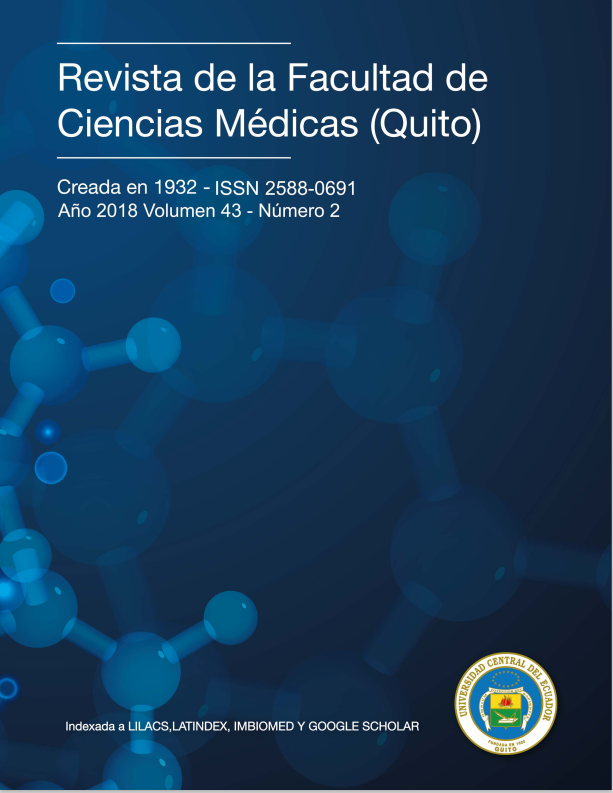Presencia de anticuerpos IgG antihelicobacter pylori en suero no se relaciona a factores de riesgo y síntomas de la enfermedad ácido-péptica en adultos jóvenes
DOI:
https://doi.org/10.29166/rfcmq.v43i2.2817Keywords:
Helicobacter pylori, young adult, serologic testAbstract
Aims: to determine the diagnostic value of anti-Helicobacter pylori IgG antibodies in case of clinical suspicion of acid-peptic disease in young adults. Subjects and methods: students of the Medicine School of the Central University of Ecuador who agreed to participate in an online survey and venous blood collection that was subjected to an immunoenzymatic test for antibody detection. Results: 225 participants with an average age of 20 years were included; the immunoenzomatic study was positive in 32.88% of samples. The existence of IgG anti H.pylori was not statistically related to the presence or absence of personal, family or social pathological history. The accumulation of two or three symptoms was not related to the serological finding. Conclusion: serological tests for diagnosis of gastritis or screening are not suitable for this age group, since its positivity is not related to symptoms, known risk factors of gastric infection or development of pathologies.
Downloads
Metrics
References
Liu K, Wong I, Leung W. Helicobacter pylori associated gastric intestinal metaplasia: treatment and
surveillance. World J Gastroenterol 2016; 22(3):1311-1320.
von Wulffen H. An assessment of serological tests for detection of Helicobacter pylori. European Journal of Clinical Microbiology and Infectious Diseases 1992; 11(7):577-582.
Karnes W, Samloff I, Siurala M, Walsh J. Positive serum antibody and negative tissue staining for Helicobacter pylori in subjects with atrophic body gastritis. Gastroenterology 1991; 101(1).
Kokkola A, Kosunen T, Puolakkainen P, Sipponen P, Harkonen M, Laxen F, et al. Spontaneous disappearance of Helicobacter pylori antibodies in patients with advanced atrophic corpus gastritis. Acta
Pathologica, microbiologica et immunologica Escandinavica. 2003.
El-Khlousy M, Rahman E, Mostafa S, Bassam A, Elgawad H, Elnasr M, et al. Study of the clinical
relevance of Helicobacter pylori virulence genes to gastric diseases among Egyptian patients. Arab J
Gastroenterol 2016; 5(16):30025-30029.
Tong W, Ye F, He L, Cui L, Cui M, Hu Y, et al. Serum biomarker panels for diagnosis of gastric cancer.
Onco Targets Ther 2016; 9:2455-2463.
Nishizawa T, Suzuki H, Sakitani K, Yamashita H, Yoshida S, Hata K, et al. Family history is an independent risk factor for the progression of gastric atrophy among patients with Helicobacter pylori
infection. United European Gastroenterology Journal. 2016; 1-5.
Ortiz D, Daoud G, Salgado A, Cavazza M. Helicobacter pylori infection in children: should it be
carefully assessed? European Review for Medical and Pharmacological Sciences. 2016; 1798-1813.
Eusebi L, Zagari R, Bazzoli F. Epidemiology of Helicobacter pylori infection. 2014; 19(1):1-5.
Downloads
Published
How to Cite
Issue
Section
License
Copyright (c) 2021 Gabriel Vasco, Consuelo Luna, Judith Torres, César Padilla

This work is licensed under a Creative Commons Attribution-NonCommercial-NoDerivatives 4.0 International License.











